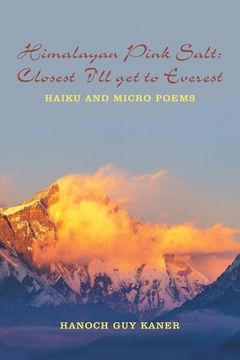Himalayan Pink Salt: Closest I'll Get to Everest: Haiku and Micro Poems (en Inglés)
Reseña del libro "Himalayan Pink Salt: Closest I'll Get to Everest: Haiku and Micro Poems (en Inglés)"
Hanoch Guy Kaner calls these poems "micro-poems," and as such they need not be subject to or constrained by comparisons with English approximations of 'haiku' nor the conventions that govern such according to any given arbiter of what and what is not--if anything is, a 'haiku' in English. Still, these poems may be read as Hanoch Guy Kaner's own sense of what a 'haiku-like' poem in English can and may do. For, Hanoch Guy Kaner is a polymorphous poet; he is polymorphous-in-verse. Through an imaginative empathetic resonance, and because he is polymorphous poetic, he has intuited (from within, and because of, his own poetry writing) something Basho taught: "When you use words as kireji, every word becomes kireji. When you do not use words as kireji, there are no words which are kireji. From this point, grasp the very depth of the nature of kireji on your own." These micro-poems use words as kireji; thus every word of them has become kireji. These poems are written in, call it, the 'disjunctive tense'--"the now, the here, through which all future plunges to the past," as Joyce wrote. Each line of a poem is disjunctive, working with and against itself, with and against those lines before and after. The poem is not trying to 'be in the moment' while trying not to be 'caught' in remembering the past (that illusory, false impasse), no. These are poems of "afterwards-ness," nochdemkeyt, the after-now, the recollected-present, awakening the moment-after. For Hanoch Guy Kaner, each of these poems is a haiku d'état, a "finale of seem." They are too, sometimes, what the poet Rachel Bluwstein named, "flowers of Maybe." From this point, Hanoch Guy Kaner invites us to grasp the very depth of the nature of "the now, the here" on our own. --Robert G. Margolis

